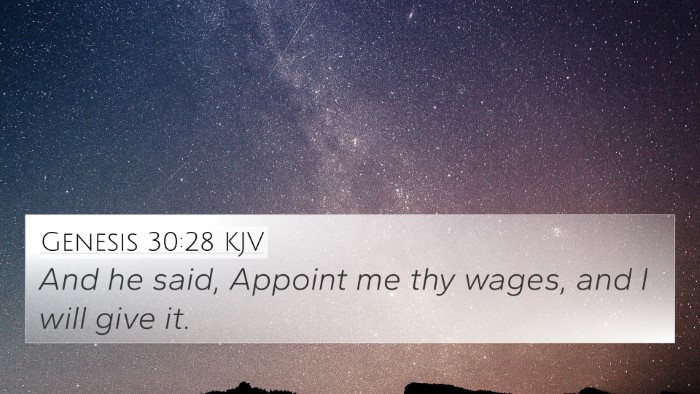Understanding Genesis 29:15 - A Combined Commentary
Genesis 29:15 states: "Then Laban said to Jacob, Because you are my relative, should you therefore serve me for nothing? Tell me, what should your wages be?"
This verse introduces the context of Jacob's service under Laban, showcasing themes of labor, expectation, and familial obligation.
Analysis of Key Themes
- Familial Relationships:
Matthew Henry emphasizes the importance of the relationship between Laban and Jacob, suggesting that kinship should promote fair treatment. Laban's question highlights the expectation that family should not serve one another without remuneration.
- Labor and Compensation:
Albert Barnes notes that Laban's inquiry about wages reflects a broader principle in society regarding labor and compensation. It indicates that even within family dynamics, the value of work must be acknowledged.
- Covenantal Context:
Adam Clarke interprets this as a reflection of the covenantal principles that govern relationships. Jacob, coming to Laban as a fugitive, is in a vulnerable position, and Laban's response pivots around economic reciprocity within divine providence.
Cross References
This verse connects deeply with several other Bible verses, enhancing its meaning through scriptural cross-referencing. Here are some notable connections:
- Genesis 31:6-7 - Jacob reflects on the way he served Laban and how Laban changed his wages.
- Exodus 21:16 - The legislation regarding servitude and compensation in Israelite society.
- Leviticus 19:13 - Laws concerning fair labor practices and withholding wages.
- Colossians 3:23-24 - New Testament teachings about serving without eye service as pleasing to the Lord.
- 1 Timothy 5:18 - The principle that a laborer is worthy of their hire echoes throughout scripture.
- James 5:4 - A reminder of how God hears the cries of the laborers whose wages have been withheld.
- Proverbs 14:23 - The wisdom that in all labor there is profit, but mere talk leads to poverty.
Thematic Connections
The themes found in this verse connect with broader scriptural motifs:
- Justice and Fairness: The Bible consistently discusses justice and fairness in labor, highlighting that workers deserve fair wages.
- Paternal Relationships: The expectations and dynamics of family relationships are essential throughout the scripture, including duty and service to one another.
Practical Application
Understanding Genesis 29:15 allows us to reflect on our relationships, particularly concerning fairness in our dealings, both in familial and professional settings. It encourages us to maintain a balance between service to family and the acknowledgement of labor and compensation.
Conclusion
In Genesis 29:15, Laban’s inquiry to Jacob opens a dialogue about the nature of service and remuneration. By exploring cross-references and understanding the context of this verse, we strip down layers of meaning that enhance both biblical understanding and practical daily living.




